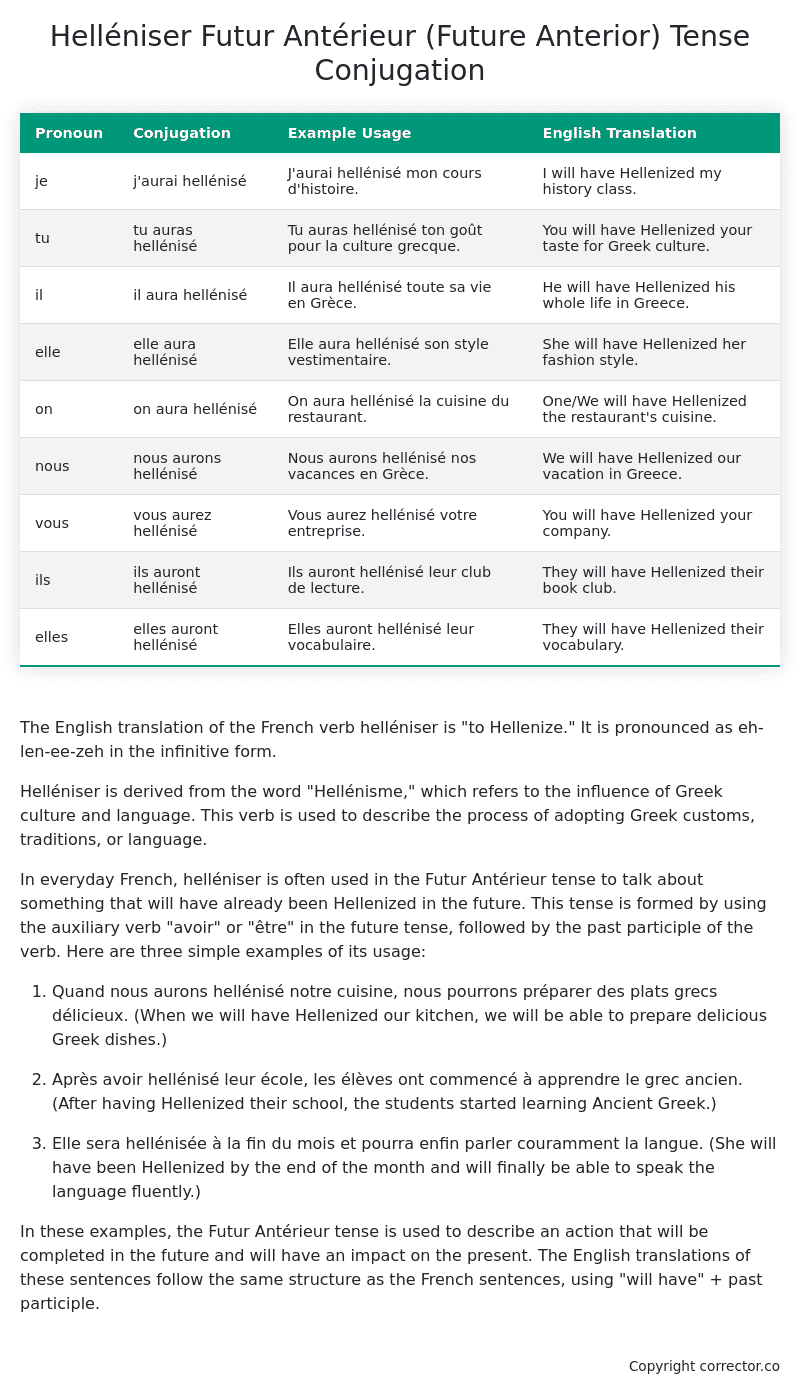Futur Antérieur (Future Anterior) Tense Conjugation of the French Verb helléniser
Introduction to the verb helléniser
The English translation of the French verb helléniser is “to Hellenize.” It is pronounced as eh-len-ee-zeh in the infinitive form.
Helléniser is derived from the word “Hellénisme,” which refers to the influence of Greek culture and language. This verb is used to describe the process of adopting Greek customs, traditions, or language.
In everyday French, helléniser is often used in the Futur Antérieur tense to talk about something that will have already been Hellenized in the future. This tense is formed by using the auxiliary verb “avoir” or “être” in the future tense, followed by the past participle of the verb. Here are three simple examples of its usage:
-
Quand nous aurons hellénisé notre cuisine, nous pourrons préparer des plats grecs délicieux. (When we will have Hellenized our kitchen, we will be able to prepare delicious Greek dishes.)
-
Après avoir hellénisé leur école, les élèves ont commencé à apprendre le grec ancien. (After having Hellenized their school, the students started learning Ancient Greek.)
-
Elle sera hellénisée à la fin du mois et pourra enfin parler couramment la langue. (She will have been Hellenized by the end of the month and will finally be able to speak the language fluently.)
In these examples, the Futur Antérieur tense is used to describe an action that will be completed in the future and will have an impact on the present. The English translations of these sentences follow the same structure as the French sentences, using “will have” + past participle.
Table of the Futur Antérieur (Future Anterior) Tense Conjugation of helléniser
| Pronoun | Conjugation | Example Usage | English Translation |
|---|---|---|---|
| je | j’aurai hellénisé | J’aurai hellénisé mon cours d’histoire. | I will have Hellenized my history class. |
| tu | tu auras hellénisé | Tu auras hellénisé ton goût pour la culture grecque. | You will have Hellenized your taste for Greek culture. |
| il | il aura hellénisé | Il aura hellénisé toute sa vie en Grèce. | He will have Hellenized his whole life in Greece. |
| elle | elle aura hellénisé | Elle aura hellénisé son style vestimentaire. | She will have Hellenized her fashion style. |
| on | on aura hellénisé | On aura hellénisé la cuisine du restaurant. | One/We will have Hellenized the restaurant’s cuisine. |
| nous | nous aurons hellénisé | Nous aurons hellénisé nos vacances en Grèce. | We will have Hellenized our vacation in Greece. |
| vous | vous aurez hellénisé | Vous aurez hellénisé votre entreprise. | You will have Hellenized your company. |
| ils | ils auront hellénisé | Ils auront hellénisé leur club de lecture. | They will have Hellenized their book club. |
| elles | elles auront hellénisé | Elles auront hellénisé leur vocabulaire. | They will have Hellenized their vocabulary. |
Other Conjugations for Helléniser.
Le Present (Present Tense) Conjugation of the French Verb helléniser
Imparfait (Imperfect) Tense Conjugation of the French Verb helléniser
Passé Simple (Simple Past) Tense Conjugation of the French Verb helléniser
Passé Composé (Present Perfect) Tense Conjugation of the French Verb helléniser
Futur Simple (Simple Future) Tense Conjugation of the French Verb helléniser
Futur Proche (Near Future) Tense Conjugation of the French Verb helléniser
Plus-que-parfait (Pluperfect) Tense Conjugation of the French Verb helléniser
Passé Antérieur (Past Anterior) Tense Conjugation of the French Verb helléniser
Futur Antérieur (Future Anterior) Tense Conjugation of the French Verb helléniser (this article)
Subjonctif Présent (Subjunctive Present) Tense Conjugation of the French Verb helléniser
Subjonctif Passé (Subjunctive Past) Tense Conjugation of the French Verb helléniser
Subjonctif Imparfait (Subjunctive Imperfect) Tense Conjugation of the French Verb helléniser
Subjonctif Plus-que-parfait (Subjunctive Pluperfect) Tense Conjugation of the French Verb helléniser
Conditionnel Présent (Conditional Present) Tense Conjugation of the French Verb helléniser
Conditionnel Passé (Conditional Past) Tense Conjugation of the French Verb helléniser
L’impératif Présent (Imperative Present) Tense Conjugation of the French Verb helléniser
L’infinitif Présent (Infinitive Present) Tense Conjugation of the French Verb helléniser
Struggling with French verbs or the language in general? Why not use our free French Grammar Checker – no registration required!
Get a FREE Download Study Sheet of this Conjugation 🔥
Simply right click the image below, click “save image” and get your free reference for the helléniser Futur Antérieur tense conjugation!

Helléniser – About the French Futur Antérieur (Future Anterior) Tense
Construction
Common Everyday Usage Patterns
Interactions with Other Tenses
For example
Summary
I hope you enjoyed this article on the verb helléniser. Still in a learning mood? Check out another TOTALLY random French verb conjugation!


